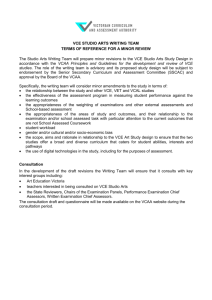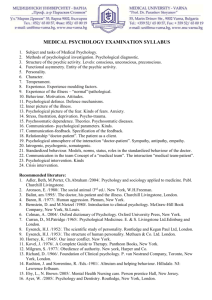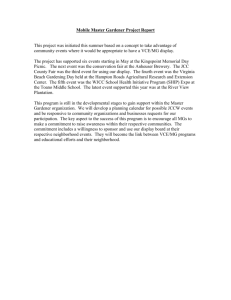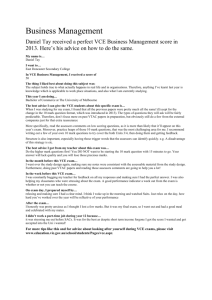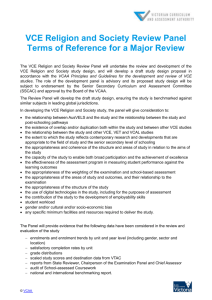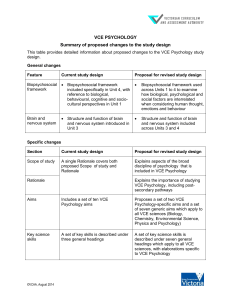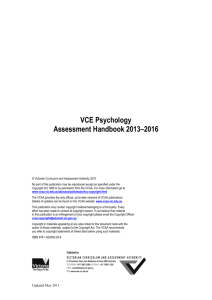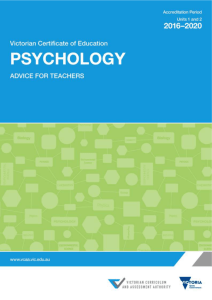VCE Psychology 2016 – 2021 Study Summary
advertisement
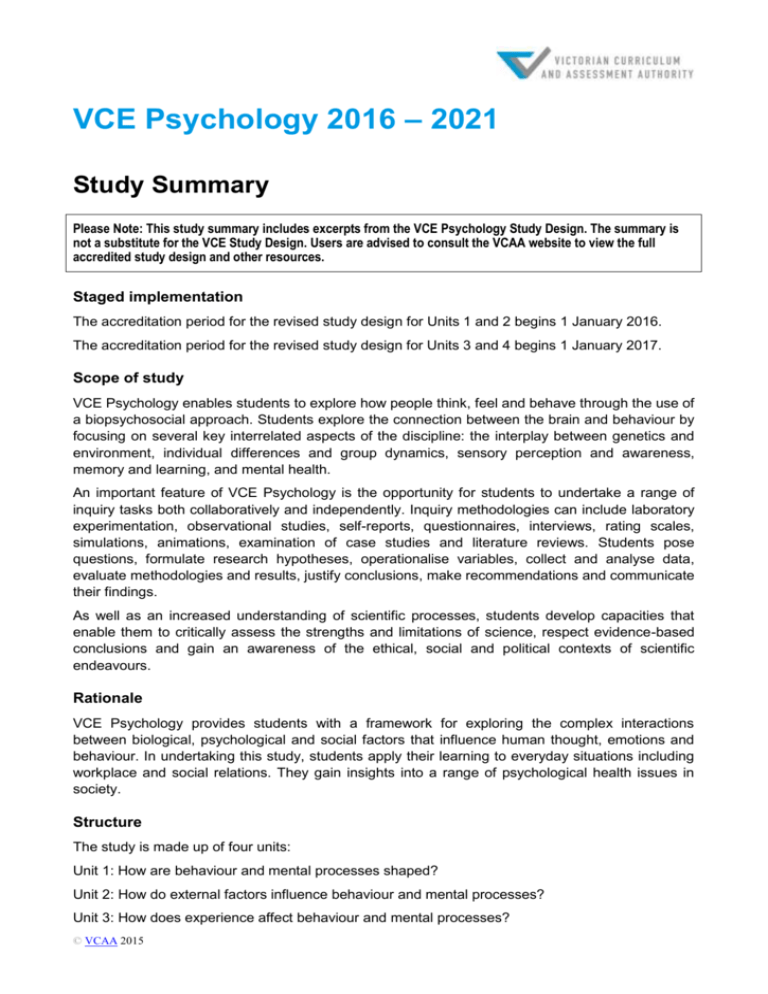
VCE Psychology 2016 – 2021 Study Summary Please Note: This study summary includes excerpts from the VCE Psychology Study Design. The summary is not a substitute for the VCE Study Design. Users are advised to consult the VCAA website to view the full accredited study design and other resources. Staged implementation The accreditation period for the revised study design for Units 1 and 2 begins 1 January 2016. The accreditation period for the revised study design for Units 3 and 4 begins 1 January 2017. Scope of study VCE Psychology enables students to explore how people think, feel and behave through the use of a biopsychosocial approach. Students explore the connection between the brain and behaviour by focusing on several key interrelated aspects of the discipline: the interplay between genetics and environment, individual differences and group dynamics, sensory perception and awareness, memory and learning, and mental health. An important feature of VCE Psychology is the opportunity for students to undertake a range of inquiry tasks both collaboratively and independently. Inquiry methodologies can include laboratory experimentation, observational studies, self-reports, questionnaires, interviews, rating scales, simulations, animations, examination of case studies and literature reviews. Students pose questions, formulate research hypotheses, operationalise variables, collect and analyse data, evaluate methodologies and results, justify conclusions, make recommendations and communicate their findings. As well as an increased understanding of scientific processes, students develop capacities that enable them to critically assess the strengths and limitations of science, respect evidence-based conclusions and gain an awareness of the ethical, social and political contexts of scientific endeavours. Rationale VCE Psychology provides students with a framework for exploring the complex interactions between biological, psychological and social factors that influence human thought, emotions and behaviour. In undertaking this study, students apply their learning to everyday situations including workplace and social relations. They gain insights into a range of psychological health issues in society. Structure The study is made up of four units: Unit 1: How are behaviour and mental processes shaped? Unit 2: How do external factors influence behaviour and mental processes? Unit 3: How does experience affect behaviour and mental processes? © VCAA 2015 VCE Psychology 2016 – 2021 Unit 4: How is wellbeing developed and maintained? Entry There are no prerequisites for entry to Units 1, 2 and 3. Students must undertake Unit 3 prior to undertaking Unit 4. Unit 1: How are behaviour and mental processes shaped? In this unit students investigate the structure and functioning of the human brain and the role it plays in the overall functioning of the human nervous system. Students explore brain plasticity and the influence that brain damage may have on a person’s psychological functioning. They consider the complex nature of psychological development, including situations where psychological development may not occur as expected. Unit 2: How do external factors influence behaviour and metal processes? A person’s thoughts, feelings and behaviours are influenced by a variety of biological, psychological and social factors. In this unit students investigate how perception of stimuli enables a person to interact with the world around them and how their perception of stimuli can be distorted. They evaluate the role social cognition plays in a person’s attitudes, perception of themselves and relationships with others. Students explore a variety of factors and contexts that can influence the behaviour of an individual and groups. Unit 3: How does experience affect behaviour and metal processes? The nervous system influences behaviour and the way people experience the world. In this unit students examine the functioning of the nervous system to explain how a person can interact with the world around them. They explore how stress may affect a person’s psychological functioning and consider the causes and management of stress. Students investigate how mechanisms of memory and learning lead to the acquisition of knowledge, the development of new capacities and changed behaviours. They consider the limitations and fallibility of memory and how memory can be improved. Unit 4: How is wellbeing developed and maintained? Consciousness and mental health are two of many psychological constructs that can be explored by studying the relationship between the mind, brain and behaviour. In this unit, students examine the nature of consciousness and how changes in levels of consciousness can affect mental processes and behaviour. They consider the role of sleep and the impact that sleep disturbances may have on a person’s functioning. Students explore the concept of a mental health continuum and apply a biopsychosocial approach to analyse mental health and disorder. They use specific phobia to illustrate how the development and management of a mental disorder can be considered as an interaction between biological, psychological and social factors. Assessment Satisfactory completion The award of satisfactory completion for a unit is based on a decision that the student has demonstrated achievement of the set of outcomes specified for the unit. This decision will be based on the teacher’s assessment of the student’s performance on assessment tasks designated for the unit. Levels of achievement © VCAA 2015 Page 2 VCE Psychology 2016 – 2021 Units 1 and 2 Procedures for the assessment of levels of achievement in Units 1 and 2 are a matter for school decision. Units 3 and 4 The Victorian Curriculum and Assessment Authority will supervise the assessment of all students undertaking Units 3 and 4. In the study of VCE Psychology the student’s level of achievement will be determined by School-assessed Coursework as specified in the VCE Psychology study design and external assessment. Percentage contributions to the study score in VCE Psychology are as follows: Unit 3 School-assessed Coursework: 16 per cent Unit 4 School-assessed Coursework: 24 per cent End-of-year examination: 60 per cent. © VCAA 2015 Page 3
